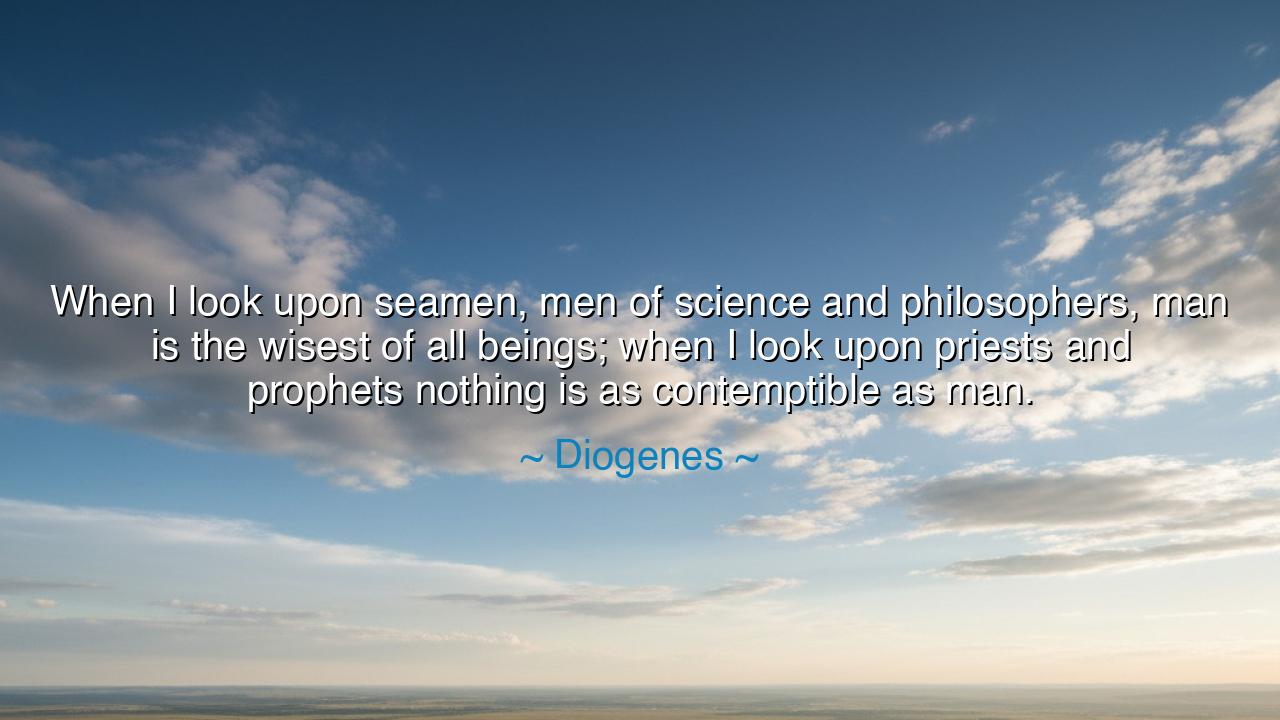
When I look upon seamen, men of science and philosophers, man is
When I look upon seamen, men of science and philosophers, man is the wisest of all beings; when I look upon priests and prophets nothing is as contemptible as man.






"When I look upon seamen, men of science and philosophers, man is the wisest of all beings; when I look upon priests and prophets nothing is as contemptible as man." These powerful words, spoken by Diogenes, the ancient Cynic philosopher, carry with them a sharp critique of human nature and the institutions that claim to guide it. Diogenes, known for his unconventional lifestyle and brutal honesty, contrasted the wisdom found in the practical and intellectual pursuits of seamen, scientists, and philosophers with the hollow pretensions of priests and prophets, who, in his view, exploited the human thirst for knowledge and understanding for their own gain. To Diogenes, the truly wise were those who sought truth through experience, observation, and reason, while those who relied on divine authority or supernatural claims were, at best, misguided, and at worst, deceitful.
In the ancient world, there was a strong tension between reason and faith, between philosophers who sought truth through questioning and logic, and religious figures who often claimed authority over the mysteries of existence. Socrates, for example, was one of the greatest philosophers of ancient Greece, a man who spent his life questioning and challenging conventional wisdom in pursuit of truth. Unlike the priests and prophets who often relied on dogma and tradition to justify their beliefs, Socrates sought to understand the world through reasoned dialogue and logical inquiry. He recognized that true wisdom came not from unquestioned belief, but from the courage to face uncertainty and challenge assumptions. Diogenes, too, stood as a figure who rejected the pomp and ritual of religion, choosing instead to embrace a life of simplicity, honesty, and self-sufficiency.
Consider the story of Galileo Galilei, who, in the face of overwhelming opposition from religious authorities, boldly defended the heliocentric model of the universe, which proposed that the Earth revolves around the Sun. Galileo’s pursuit of scientific truth led him to challenge the deeply ingrained beliefs of the Catholic Church, which at the time held that the Earth was the center of the universe. Galileo’s work, grounded in empirical observation and scientific method, brought him into direct conflict with religious authorities who sought to suppress his findings. Like Diogenes, Galileo believed that true wisdom came not from religious dogma, but from the careful study of the natural world. His unwavering commitment to reason and evidence over tradition ultimately led to the advancement of human knowledge, while the religious authorities, by clinging to outdated beliefs, sought to stifle progress.
The figure of Diogenes himself stands as a living critique of the institutions of his time. Known for his ascetic lifestyle and disregard for social conventions, Diogenes mocked the pretensions of both philosophers and priests alike. He is said to have wandered the streets of Athens with a lantern, searching for an honest man, a symbol of his disdain for the falsehoods and pretensions he saw around him. Diogenes believed that virtue was found not in the elaborate rituals and claims of authority that many revered, but in living simply, honestly, and in accordance with nature. His scorn for priests and prophets came from his belief that they exploited the ignorance and fear of the masses for their own power, while the true wisdom of life was found in those who lived with integrity and self-awareness.
The lesson that Diogenes imparts is as relevant today as it was in ancient times. We live in a world where authority—whether religious, political, or academic—is often elevated above critical inquiry and self-reliance. Like Diogenes, we must be wary of those who claim to hold the truth without evidence, who seek to control our understanding of the world through fear or dogma. Instead, we must turn to the seamen, the scientists, and the philosophers—those who seek the truth not through divine revelation or societal approval, but through personal experience, rational thought, and humility. Wisdom is found in the willingness to question and to face the uncertainties of the world with an open mind, not in the blind following of those who claim to have all the answers.
As we navigate our own lives, we should be inspired by the example of Diogenes and the great minds of history who have embraced the pursuit of truth above all else. In our personal and collective journeys, we must remember that true wisdom does not lie in adhering to inherited beliefs or seeking comfort in the authority of others. It is found in the courage to question, the humility to recognize our ignorance, and the dedication to seek understanding through our own efforts. Just as Galileo defied the religious establishment to uncover the truths of the universe, so too must we defy the forces that seek to limit our knowledge and understanding. Let us live with the spirit of Diogenes, seeking honesty and truth above all else, and rejecting the falsehoods that enslave our minds.
So, let us ask ourselves: are we living as independent thinkers, grounded in reason and honesty, or are we too quick to follow those who claim to have all the answers? The true measure of wisdom lies not in blind faith, but in the strength of character to question, to explore, and to discover the deeper truths that lie hidden beneath the surface of our everyday lives. Honor the spirit of Diogenes, and embrace the journey of self-awareness and truth-seeking, wherever it may lead.






AAdministratorAdministrator
Welcome, honored guests. Please leave a comment, we will respond soon